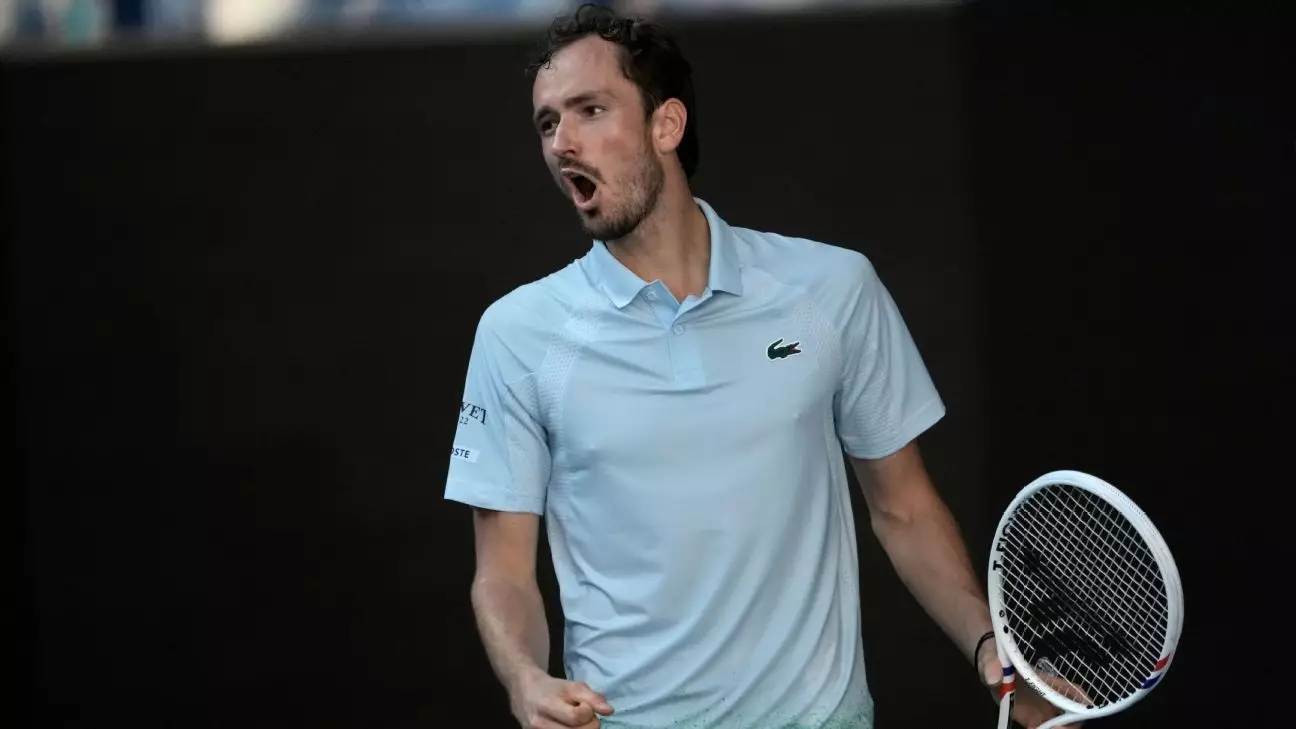In the opening round of the Australian Open, the highly anticipated match-up between No. 5 seed Daniil Medvedev and the 418th-ranked wildcard entry, Kasidit Samrej, illuminated the unpredictable nature of tennis. Medvedev, a seasoned player with a US Open title and multiple Grand Slam finals under his belt, was expected to cruise through this match. However, as the match unfolded, it became evident that the sport’s inherent unpredictability could turn even the most straightforward encounters into monumental battles. Medvedev faced an unexpected challenge, with Samrej displaying tenacity and skill that had not been widely recognized before.
The pivotal moment of the match came at a time when Medvedev found himself struggling. Frustration boiled over when he lost a crucial point in the third set, prompting him to unleash his rage on a small camera mounted on the net. This incident, while regrettable, is a testament to the psychological pressure athletes face during high-stakes competitions. Medvedev’s explosive reaction culminated in breaking his racket, resulting in a code violation for racket abuse and a poignant reminder that even the best can succumb to the turmoil of competition. Interestingly, this act of frustration appeared to be a catalyst for a shift in his mindset.
After losing the third set, it would have been easy for Medvedev to become disheartened and succumb to the weight of the moment. Yet, demonstrating remarkable resilience, he transformed his performance. The fourth and fifth sets saw him reclaiming control of the match, winning twelve of the final fifteen games and showcasing an impressive ability to pivot under pressure. Medvedev’s dominance was marked by a staggering 24 aces which highlighted his serve’s efficiency and control. The drastic reduction in unforced errors—34 for Medvedev compared to Samrej’s staggering 69—also illustrated his regained focus and tactical superiority.
While Medvedev’s experience and composure ultimately led him to victory, it’s essential to acknowledge the impressive performance of Kasidit Samrej. Making his Grand Slam debut, he demonstrated poise and skill that caught Medvedev off-guard, particularly during the second and third sets. This match was pivotal not only for Medvedev but also for the young player who had entered this high-pressure arena with little prior experience against top-tier opponents. Despite his eventual loss, Samrej’s spirited performance sets a foundation for future aspirations in the sport.
Medvedev, reflecting on his performance, aptly noted, “In the end of last year, this match, I probably would have lost it. New year, new energy.” This statement encapsulates the concept of growth within professional athletics. It presents a portrait of a player who learns from past experiences, utilizing them to bolster his mental resilience. Transitioning into a new season, Medvedev recognized the need to adapt and evolve continually, a trait that distinguishes successful athletes in tennis and beyond.
Furthermore, his acknowledgment of Samrej’s unexpected level of play also signifies a respect for the unpredictable nature of sports; anyone can rise to the occasion and challenge those considered favorites.
As Medvedev progresses further into the Australian Open, his ability to regain focus post-frustration will be a crucial aspect of his campaign. The early rounds of any Grand Slam often serve as testing grounds, revealing both strengths and areas for improvement. The match against Samrej, while a shaky start, also presents an opportunity for reflection and growth, underscoring the relentless pursuit of excellence that characterizes elite athletes’ careers.
Ultimately, the Australian Open serves as a reminder that resilience, adaptability, and respect for one’s opponents remain cornerstones of success in the sport. Daniil Medvedev emerged not just as a victor of a singular match, but as a symbol of overcoming adversity, setting the stage for what could be a promising campaign in the days to come.


Leave a Reply